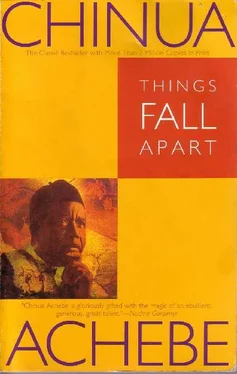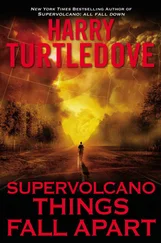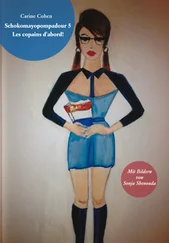Chinua Achebe - Things Fall Apart
Здесь есть возможность читать онлайн «Chinua Achebe - Things Fall Apart» весь текст электронной книги совершенно бесплатно (целиком полную версию без сокращений). В некоторых случаях можно слушать аудио, скачать через торрент в формате fb2 и присутствует краткое содержание. Город: New York, Год выпуска: 1994, Издательство: A DIVISION OF RANDOM HOUSE, INC., Жанр: Контркультура, на английском языке. Описание произведения, (предисловие) а так же отзывы посетителей доступны на портале библиотеки ЛибКат.
- Название:Things Fall Apart
- Автор:
- Издательство:A DIVISION OF RANDOM HOUSE, INC.
- Жанр:
- Год:1994
- Город:New York
- ISBN:нет данных
- Рейтинг книги:2 / 5. Голосов: 2
-
Избранное:Добавить в избранное
- Отзывы:
-
Ваша оценка:
- 40
- 1
- 2
- 3
- 4
- 5
Things Fall Apart: краткое содержание, описание и аннотация
Предлагаем к чтению аннотацию, описание, краткое содержание или предисловие (зависит от того, что написал сам автор книги «Things Fall Apart»). Если вы не нашли необходимую информацию о книге — напишите в комментариях, мы постараемся отыскать её.
—W. B. Yeats, "The Second Coming"
Things Fall Apart — читать онлайн бесплатно полную книгу (весь текст) целиком
Ниже представлен текст книги, разбитый по страницам. Система сохранения места последней прочитанной страницы, позволяет с удобством читать онлайн бесплатно книгу «Things Fall Apart», без необходимости каждый раз заново искать на чём Вы остановились. Поставьте закладку, и сможете в любой момент перейти на страницу, на которой закончили чтение.
Интервал:
Закладка:
"Does the white man understand our custom about land?"
"How can he when he does not even speak our tongue? But he says that our customs are bad,– and our own brothers who have taken up his religion also say that our customs are bad. How do you think we can fight when our own brothers have turned against us? The white man is very clever. He came quietly and peaceably with his religion. We were amused at his foolishness and allowed him to stay. Now he has won our brothers, and our clan can no longer act like one. He has put a knife on the things that held us together and we have fallen apart."
"How did they get hold of Ancto to hang him?" asked Okonkwo.
"When he killed Oduche in the fight over the land, he fled to Aninta to escape the wrath of the earth. This was about eight days after the fight, because Oduche had not died immediately from his wounds. It was on the seventh day that he died. But everybody knew that he was going to die and Aneto got his belongings together in readiness to flee. But the Christians had told the white man about the accident, and he sent his kotma to catch Aneto. He was imprisoned with all the leaders of his family. In the end Oduche died and Aneto was taken to Umuru and hanged. The other people were released, but even now they have not found the mouth with which to tell of their suffering."
The two men sat in silence for a long while afterwards.
CHAPTER TWENTY-ONE
There were many men and women in Umuofia who did not feel as strongly as Okonkwo about the new dispensation. The white man had indeed brought a lunatic religion, but he had also built a trading store and for the first time palm-oil and kernel became things of great price, and much money flowed into Umuofia.
And even in the matter of religion there was a growing feeling that there might be something in it after all, something vaguely akin to method in the overwhelming madness.
This growing feeling was due to Mr. Brown, the white missionary, who was very firm in restraining his flock from provoking the wrath of the clan. One member in particular was very difficult to restrain. His name was Enoch and his father was the priest of the snake cult. The story went around that Enoch had killed and eaten the sacred python, and that his father had cursed him.
Mr. Brown preached against such excess of zeal. Everything was possible, he told his energetic flock, but everything was not expedient. And so Mr. Brown came to be respected even by the clan, because he trod softly on its faith. He made friends with some of the great men of the clan and on one of his frequent visits to the neighboring villages he had been presented with a carved elephant tusk, which was a sign of dignity and rank. One of the great men in that village was called Akunna and he had given one of his sons to be taught the white man's knowledge in Mr. Brown's school.
Whenever Mr. Brown went to that village he spent long hours with Akunna in his obi talking through an interpreter about religion. Neither of them succeeded in converting the other but they learned more about their different beliefs.
"You say that there is one supreme God who made heaven and earth," said Akunna on one of Mr. Brown's visits. "We also believe in Him and call Him Chukwu. He made all the world and the other gods."
"There are no other gods," said Mr. Brown. "Chukwu is the only God and all others are false. You carve a piece of wood—like that one" (he pointed at the rafters from which Akunna's carved Ikencja hung), "and you call it a god. But it is still a piece of wood."
"Yes," said Akunna. "It is indeed a piece of wood. The tree from which it came was made by Chukwu, as indeed all minor gods were. But He made them for His messengers so that we could approach Him through them. It is like yourself. You are the head of your church."
"No," protested Mr. Brown. "The head of my church is God Himself."
"I know," said Akunna, "but there must be a head in this world among men. Somebody like yourself must be the head here."
"The head of my church in that sense is in England."
"That is exactly what I am saying. The head of your church is in your country. He has sent you here as his messenger. And you have also appointed your own messengers and servants. Or let me take another example, the District Commissioner. He is sent by your king."
"They have a queen," said the interpreter on his own account.
"Your queen sends her messenger, the District Commissioner. He finds that he cannot do the work alone and so he appoints kotma to help him. It is the same with God, or Chukwu. He appoints the smaller gods to help Him because His work is too great for one person."
"You should not think of Him as a person," said Mr. Brown. "It is because you do so that you imagine He must need helpers. And the worst thing about it is that you give all the worship to the false gods you have created."
"That is not so. We make sacrifices to the little gods, but when they fail and there is no one else to turn to we go to Chukwu. It is right to do so. We approach a great man through his servants. But when his servants fail to help us, then we go to the last source of hope. We appear to pay greater attention to the little gods but that is not so. We worry them more because we are afraid to worry their Master. Our fathers knew that Chukwu was the Overlord and that is why many of them gave their children the name Chukwuka—"Chukwu is Supreme."
"You said one interesting thing," said Mr. Brown. "You are afraid of Chukwu. In my religion Chukwu is a loving Father and need not be feared by those who do His will."
"But we must fear Him when we are not doing His will," said Akunna. "And who is to tell His will? It is too great to be known."
In this way Mr. Brown learned a good deal about the religion of the clan and he came to the conclusion that a frontal attack on it would not succeed. And so he built a school and a little hospital in Umuofia. He went from family to family begging people to send their children to his school. But at first they only sent their slaves or sometimes their lazy children. Mr. Brown begged and argued and prophesied. He said that the leaders of the land in the future would be men and women who had learned to read and write. If Umuofia failed to send her children to the school, strangers would come from other places to rule them. They could already see that happening in the Native Court, where the D.C. was surrounded by strangers who spoke his tongue. Most of these strangers came from the distant town of Umuru on the bank of the Great River where the white man first went.
In the end Mr. Brown's arguments began to have an effect. More people came to learn in his school, and he encouraged them with gifts of singlets and towels. They were not all young, these people who came to learn. Some of them were thirty years old or more. They worked on their farms in the morning and went to school in the afternoon. And it was not long before the people began to say that the white man's medicine was quick in working. Mr. Brown's school produced quick results. A few months in it were enough to make one a court messenger or even a court clerk. Those who stayed longer became teachers,– and from Umuofia laborers went forth into the Lord's vineyard. New churches were established in the surrounding villages and a few schools with them. From the very beginning religion and education went hand in hand. Mr. Brown's mission grew from strength to strength, and because of its link with the new administration it earned a new social prestige. But Mr. Brown himself was breaking down in health. At first he ignored the warning signs. But in the end he had to leave his flock, sad and broken.
It was in the first rainy season after Okonkwo's return to Umuofia that Mr. Brown left for home. As soon as he had learned of Okonkwo's return five months earlier, the missionary had immediately paid him a visit. He had just sent Okonkwo's son, Nwoye, who was now called Isaac, to the new training college for teachers in Umuru. And he had hoped that Okonkwo would be happy to hear of it. But Okonkwo had driven him away with the threat that if he came into his compound again, he would be carried out of it.
Читать дальшеИнтервал:
Закладка:
Похожие книги на «Things Fall Apart»
Представляем Вашему вниманию похожие книги на «Things Fall Apart» списком для выбора. Мы отобрали схожую по названию и смыслу литературу в надежде предоставить читателям больше вариантов отыскать новые, интересные, ещё непрочитанные произведения.
Обсуждение, отзывы о книге «Things Fall Apart» и просто собственные мнения читателей. Оставьте ваши комментарии, напишите, что Вы думаете о произведении, его смысле или главных героях. Укажите что конкретно понравилось, а что нет, и почему Вы так считаете.












